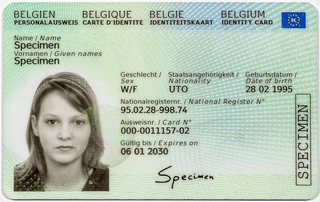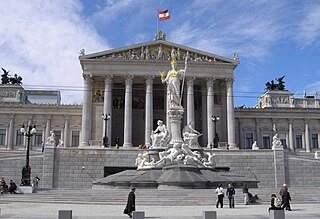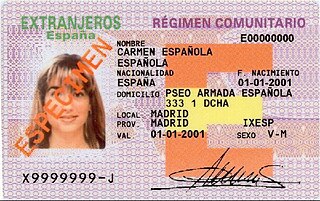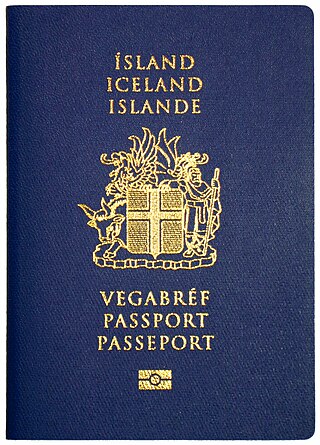Related Research Articles

A visa is a conditional authorization granted by a polity to a foreigner that allows them to enter, remain within, or leave its territory. Visas typically include limits on the duration of the foreigner's stay, areas within the country they may enter, the dates they may enter, the number of permitted visits, or if the individual can work in the country in question. Visas are associated with the request for permission to enter a territory and thus are, in most countries, distinct from actual formal permission for an alien to enter and remain in the country. In each instance, a visa is subject to entry permission by an immigration official at the time of actual entry and can be revoked at any time. Visa evidence most commonly takes the form of a sticker endorsed in the applicant's passport or other travel document but may also exist electronically. Some countries no longer issue physical visa evidence, instead recording details only in immigration databases.

Foreign workers or guest workers are people who work in a country other than one of which they are a citizen. Some foreign workers use a guest worker program in a country with more preferred job prospects than in their home country. Guest workers are often either sent or invited to work outside their home country or have acquired a job before leaving their home country, whereas migrant workers often leave their home country without a specific job in prospect.
Permanent residency is a person's legal resident status in a country or territory of which such person is not a citizen but where they have the right to reside on a permanent basis. This is usually for a permanent period; a person with such legal status is known as a permanent resident. In the United States, such a person is referred to as a green card holder but more formally as a Lawful Permanent Resident (LPR).

The European Health Insurance Card (EHIC) is issued free of charge and allows anyone who is insured by or covered by a statutory social security scheme of the EEA countries, Switzerland, and the United Kingdom to receive medical treatment in another member state in the same way as residents of that state—i.e., free or at a reduced cost—if treatment becomes necessary during their visit, or if they have a chronic pre-existing condition which requires care such as kidney dialysis. The term of validity of the card varies according to the issuing country. Continued reciprocal healthcare access between the EU and the UK was agreed, and the UK issues a UK Global Health Insurance Card (GHIC) valid in the EU, but not other EEA countries.

A Belgian identity card is a national identity card issued to all citizens of Belgium aged 12 years old and above.

Austrian nationality law details the conditions by which an individual is a national of Austria. The primary law governing these requirements is the Nationality Law, which came into force on 31 July 1985.
The freedom of movement for workers is a policy chapter of the acquis communautaire of the European Union. The free movement of workers means that nationals of any member state of the European Union can take up an employment in another member state on the same conditions as the nationals of that particular member state. In particular, no discrimination based on nationality is allowed. It is part of the free movement of persons and one of the four economic freedoms: free movement of goods, services, labour and capital. Article 45 TFEU states that:
- Freedom of movement for workers shall be secured within the Community.
- Such freedom of movement shall entail the abolition of any discrimination based on nationality between workers of the Member States as regards employment, remuneration and other conditions of work and employment.
- It shall entail the right, subject to limitations justified on grounds of public policy, public security or public health:
- The provisions of this article shall not apply to employment in the public service.

The visa policy of the Schengen Area is a component within the wider area of freedom, security and justice policy of the European Union. It applies to the Schengen Area and to other EU member states except Ireland. The visa policy allows nationals of certain countries to enter the Schengen Area via air, land or sea without a visa for up to 90 days within any 180-day period. Nationals of certain other countries are required to have a visa to enter and, in some cases, transit through the Schengen area.

European Economic Area (EEA) citizens have the right of free movement and residence throughout the EEA. This right also extends to certain family members, even if they are not EEA citizens. A Residence card of a family member of a Union citizen is issued to the family member to confirm this right of residence. The holder of a valid Residence Card is entitled to use this document in lieu of an entry visa for entry to all EEA member states. There is not a unified format for this card throughout the EU.

The Citizens' Rights Directive 2004/38/EC sets out the conditions for the exercise of the right of free movement for citizens of the European Economic Area (EEA), which includes the member states of the European Union (EU) and the three European Free Trade Association (EFTA) members Iceland, Norway and Liechtenstein. Switzerland, which is a member of EFTA but not of the EEA, is not bound by the Directive but rather has a separate multilateral sectoral agreement on free movement with the EU and its member states.

A Norwegian passport is the passport issued to nationals of Norway for the purpose of international travel. Beside serving as proof of Norwegian citizenship, they facilitate the process of securing assistance from Norwegian consular officials abroad.

The blue card is an approved EU-wide work permit allowing highly skilled non-EU citizens to work and live in 25 of the 27 countries within the European Union excluding Denmark and Ireland, which are not subject to the proposal. However, according to new rules, if it is a business trip, it does allow entry to a Schengen area member country if the country issuing the Blue Card is not a member of the Schengen area. The term Blue Card was coined by the think tank Bruegel, inspired by the United States' green card and making reference to the European flag which is blue with twelve golden stars.
A work permit or work visa is the permission to take a job within a foreign country. The foreign country where someone seeks to obtain a work permit for is also known as the "country of work", as opposed to the "country of origin" where someone holds citizenship or nationality.
Stamp 4 refers to the stamp number, or immigration status, given to an individual with permission to reside in Ireland. It is issued to people on work visas/work authorisations, to the spouse of an Irish citizen, to the spouse of an EU citizen, to refugees, to people with Irish Born Child residency and those with long-term residency status. Once a person has been granted Stamp 4 status by the Irish Department of Justice, he or she is to report to their local Garda National Immigration Bureau in order to receive the physical card, or "Certificate of Registration". The card shows the holder's Stamp 4 status, as well as their photograph and other personal details.
The UK Work Permit scheme was an immigration category used to encourage skilled workers to enter the United Kingdom (UK) until November 2008, when it was replaced by the points-based immigration system. It provided an opportunity for overseas citizens seeking to gain valuable international work experience in the UK and was often used to enable UK employers to transfer key personnel to the UK from outside the European Economic Area (EEA) region.

The Schengen Area is an area encompassing 29 European countries that have officially abolished border controls at their mutual borders. Being an element within the wider area of freedom, security and justice policy of the European Union (EU), it mostly functions as a single jurisdiction under a common visa policy for international travel purposes. The area is named after the 1985 Schengen Agreement and the 1990 Schengen Convention, both signed in Schengen, Luxembourg.

The Immigration Regulations 2006, amended by SI 2009/1117, SI 2011/1247 and SI 2015/694 and which have now been mostly repealed and superseded by the Immigration Regulations 2016, was a piece of British legislation which implemented the right of free movement of European Economic Area (EEA) nationals and their family members in the United Kingdom. It is based on Directive 2004/38/EC. It allows EEA citizens and their family members to live and work in the UK without explicit permission. Although Swiss citizens are covered by a separate bilateral agreement; they are treated basically the same as EEA nationals. Family members may need a special entry clearance to enter the UK.

The visa policy of the United Kingdom is the policy by which His Majesty's Government determines visa requirements for visitors to the United Kingdom, and the Crown dependencies of Guernsey, Jersey, and the Isle of Man and those seeking to work, study or reside there.

The visa policy of Ireland is set by the Government of Ireland and determines visa requirements for foreign citizens. If someone other than a European Union, European Economic Area, Common Travel Area or Swiss citizen seeks entry to Ireland, they must be a national of a visa-exempt country or have a valid Irish visa issued by one of the Irish diplomatic missions around the world.

Passports of the EFTA member states are passports issued by the European Free Trade Association (EFTA) member states Iceland, Liechtenstein, Norway and Switzerland. EFTA is in this article used as a common name for these countries.
References
- 1 2 "EUR-Lex - 32003L0109 - EN". Official Journal L 016, 23/01/2004 pp. 0044–0053. Retrieved August 13, 2019.
- ↑ "Brussels-Capital region: Working in Belgium as a foreign national / Work permit type C". bruxelles.irisnet.be. Retrieved January 6, 2021.
- ↑ "diplomatie.belgium.be: Cohabiting" . Retrieved August 13, 2019.
- ↑ "Cohabitation légale". Belgium.be. August 26, 2014. Retrieved August 13, 2019.
- ↑ "Brussels-Capital region: Working in Belgium as a foreign national / Work permit type B". bruxelles.irisnet.be. Retrieved January 6, 2021.
- ↑ "Archived copy" (PDF). Archived from the original (PDF) on 2011-07-06. Retrieved 2011-01-16.
{{cite web}}: CS1 maint: archived copy as title (link) - ↑ "Trends en cijfers | VDAB" (PDF). www.vdab.be. Retrieved August 13, 2019.
- ↑ "particuliers/chercher/metiersporteurs/tous/tous-les-metiers". leforem.be. Retrieved January 6, 2021.
- ↑ Christiane Lentz (May 20, 2010). "Liste der kritischen Berufe in der Deutschsprachigen Gemeinschaft 2010" (PDF). Retrieved January 6, 2021.
- ↑ [ dead link ]
- ↑ "Brussels-Capital region: Working in Belgium as a foreign national / Work permit type A". bruxelles.irisnet.be. Retrieved January 6, 2021.